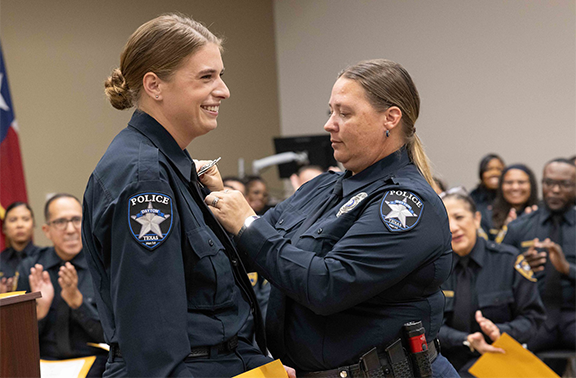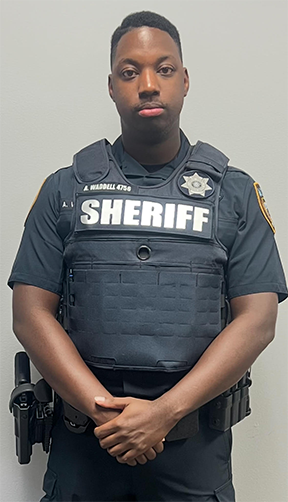Articles
Houston City College law enforcement program excels in preparing peace officers
Nov 19, 2025

Newly minted Officer Emma Clary receives her badge.
The Houston City College (HCC) law enforcement training program has built a reputation for transforming motivated students into capable, ethical peace officers — and doing so with remarkable consistency.
The program’s Basic Peace Officer Licensing academy has maintained a near perfect pass rate for new peace officers seeking Texas Commission on Law Enforcement (TCOLE) state licenses, a benchmark that program leaders say reflects rigorous instruction, strong student support and a curriculum rooted in real-world policing standards.
 “We’re preparing future officers not just to pass an exam but to protect and serve with integrity,” said Rodney Jackson, HCC program coordinator. “Our goal is to build competent, confident professionals who understand the law, respect the communities they’ll serve and are committed to doing the job the right way, every day.”
“We’re preparing future officers not just to pass an exam but to protect and serve with integrity,” said Rodney Jackson, HCC program coordinator. “Our goal is to build competent, confident professionals who understand the law, respect the communities they’ll serve and are committed to doing the job the right way, every day.”
Part of HCC’s broader Criminal Justice program, the law enforcement track offers multiple entry points for students: an Associate of Applied Science with a concentration in law enforcement, an Associate of Arts for transfer and a Certificate Level 1 for Basic Peace Officer licensing.
Students learn to articulate key concepts in police science and criminal justice, including the foundations of criminal law, community policing practices, and the role of law enforcement in a democratic society. They also analyze and apply research to Texas statutes ranging from the Penal Code and the Code of Criminal Procedure to the Family Code, Health and Safety Code, and Transportation Code.
The academy is designed to meet the varied schedules of working adults. A full-time option runs Monday through Friday from 8 a.m. to 4 p.m. for about six months, while part-time day and evening academies extend the coursework to roughly ten months with more flexible hours. Across all formats, the curriculum aligns with the stringent TCOLE standards which emphasize both the philosophical and practical dimensions of policing. Students must complete a rigorous background check and pass a psychological evaluation and physical/drug screening..
For many students, the academy represents more than career preparation — it’s a path toward personal transformation and public impact.
“I want to give back to the community where I was raised,” said Amer Waddell (pictured above), 23, now a newly pinned Harris County Sheriff’s deputy after graduating in the latest academy class this month. “My goal is to be the kind of officer who treats people fairly and handles every encounter with professionalism.”
The California native did a stint in the U.S. Navy protecting nuclear submarines on the coast of Washington State before returning to Houston to study at HCC. “The instructors in the HCC program pushed us hard to understand not just the laws but also the responsibility that comes with wearing a badge,” Waddell said. “I truly enjoyed the experience.”
Jackson said motivations like those Waddell expressed reflect the heart of the program. “When students walk into our academy, they’re focused on changing their own lives,” he said. “By the time they leave, they’re ready to change the lives of others.”
Other newly pinned graduates are serving at police agencies that include various Harris County precincts, Rice University, Texas City, Dayton and Houston Metropolitan Transit Authority police.
“These 25 students began as individual cadets and ended up as a cohesive class,” said Gil Palacios, program coordinator and instructor. “They are now law enforcement team members able to function with any law enforcement agency in the State of Texas. I’m proud of their accomplishments.”
With unwavering pass rates, strong academic pathways and a mission centered on ethics and service, HCC’s law enforcement program continues to shape the next generation of Texas peace officers — one cadet at a time.
To learn more, visit hccs.edu/policeacademy.
